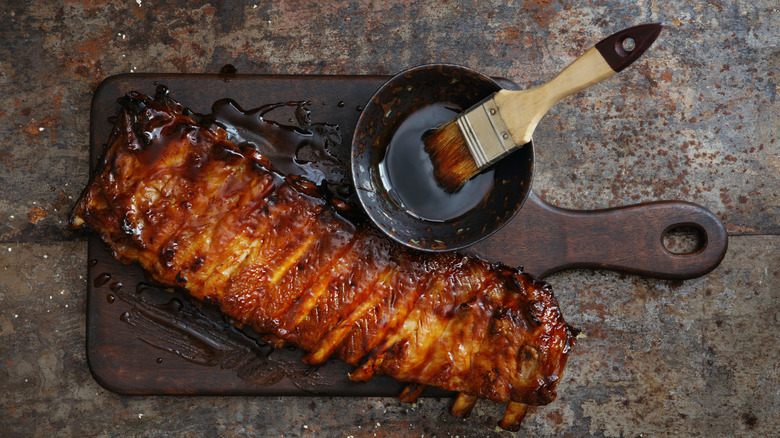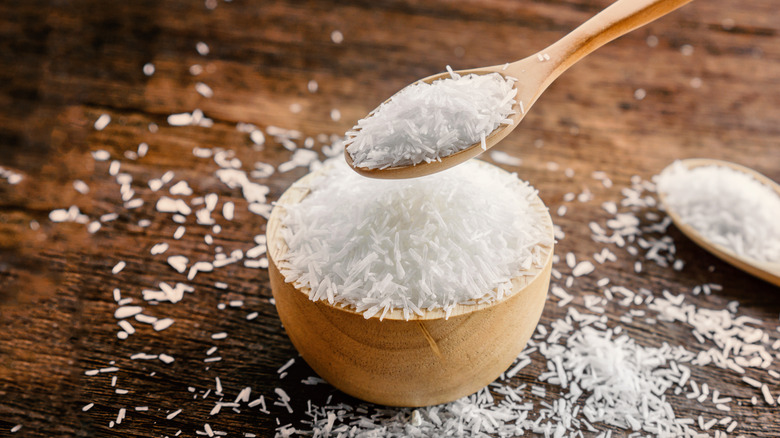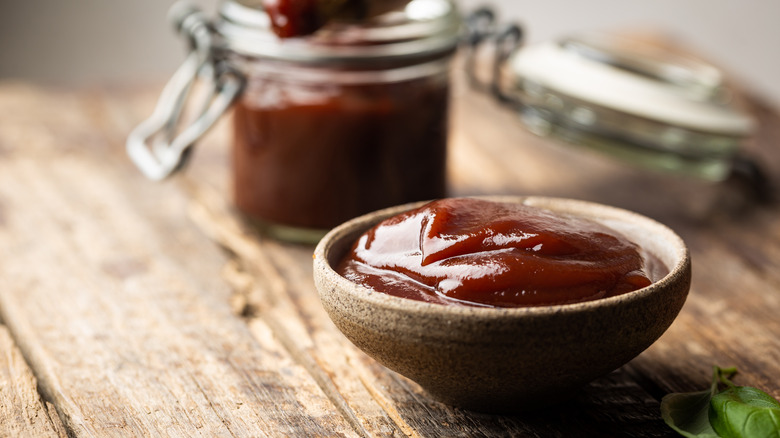Upgrade Your BBQ Sauce With A Little MSG And Thank Us Later
Whether you're frying up some chicken wings or smoking a rack of ribs, barbecue sauce is an essential condiment for hearty, cookout-crafted dishes. Although there are dozens of high-quality store-bought barbecue sauces on the market, nothing beats a scratch-made batch. At its most basic, barbecue sauce is typically made with tomato sauce or ketchup, vinegar, a sweetener, and Worcestershire sauce. Of course, flavor fanatics tend to jazz things up with added ingredients to give it a bolder, brighter, and more robust flavor. From garlic to soy sauce and liquid smoke, there's one ingredient you should consider using to transform your barbecue sauce whether it's homemade or from the store: MSG.
MSG is the sodium salt of glutamic acid — an amino acid that occurs naturally in many foods like cheese and tomatoes. Revered for its strong umami taste, introducing a dash of MSG to your barbecue sauce recipe can deepen its flavor by providing it with a layer of savory goodness that complements the smoky sweetness characteristic of a great barbecue sauce. Not only does MSG invite a new flavor to barbecue sauce, but it can also bolster the flavors of the other ingredients in the condiment, amplifying the spirit of each individual element in the sauce.
Tips for adding MSG to barbecue sauce
Adding MSG to barbecue sauce is no harder than adding salt or other spices to the condiment. However, there are a few tips to keep in mind to maximize the presence of umami in your barbecue sauce.
Just because MSG has a rich and savory profile doesn't mean you should use a lot of it. In fact, a little bit goes a long way. This sodium salt packs a hefty punch, and you don't need more than a pinch in a single serving of barbecue sauce. Even if you're feeding up to six people, you shouldn't use more than half a teaspoon. However, if you feel the sauce can benefit from a little extra umami, add a pinch more and taste as you go.
Be mindful of the other ingredients in your barbecue sauce. If you're using other umami-rich flavors like Worcestershire sauce, soy sauce, or miso in homemade barbecue sauce, reduce the amount of MSG you use in the condiment, or swap one for the other. If you're using ultra-acidic or sweet ingredients, you may benefit from a little extra MSG to balance out those flavors.
Don't just throw MSG into the finished product as a garnish. Make sure that it's dissolved into the barbecue sauce via blending or simmering to prevent the coarse granules from disrupting the smoothness of the condiment.
Busting MSG myths
You may be familiar with MSG not because it can upgrade barbecue sauce, but because of its poor reputation and the misconceptions surrounding it. However, you shouldn't think twice about using this savory ingredient in your kitchen, and there are far more reasons to add it to your barbecue sauce than to not. Although many myths surround MSG and its nutritional value, the United States Food & Drug Administration notes that MSG is "generally recognized as safe." MSG possesses only one-third of the sodium content found in salt, which means that using MSG as a partial substitute for salt can lower your sodium intake — a dietary practice the United States Department of Health and Human Services says is proven to improve heart health.
Some individuals claim to experience headaches and other unwelcome symptoms after consuming food containing MSG. However, scientific studies have failed to consistently support these claims, and the symptoms are more likely attributable to factors like psychological expectations and other ingredients.
Finally, the stigma around MSG is ending. Don't believe the misguided myths — incorporate MSG into your barbecue sauce to give it a bigger, bolder, and more savory flavor.


